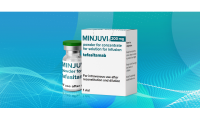-
Comanche raises $75m to develop preeclampsia therapy
- Source: drugdu
- 93
- January 22, 2024
-
Synendos set to study endocannabinoid inhibitor for neuropsychiatric conditions
- Source: drugdu
- 82
- January 22, 2024
-
Merck’s Keytruda again bags industry-first cervical cancer nod—with limitation
- Source: drugdu
- 88
- January 21, 2024
-
report
- Source: drugdu
- 131
- January 20, 2024
-
Lundbeck launches ‘Say Yep’ for new Vyepti multi-media migraine campaign
- Source: drugdu
- 138
- January 20, 2024
-
Bayer CEO Bill Anderson makes his mark with major restructuring, ‘significant’ job cuts
- Source: drugdu
- 183
- January 20, 2024
-
Gearing Up to Challenge Pfizer in a Rare Disease, BridgeBio Secures Up to $1.25B
- Source: drugdu
- 167
- January 20, 2024
-
Coya stretches lead drug’s development to Parkinson’s and dementia
- Source: drugdu
- 117
- January 19, 2024
-
J&J, AZ/Daiichi Sankyo cancer therapies lead Clarivate’s annual rundown of notable new meds
- Source: drugdu
- 149
- January 19, 2024
your submission has already been received.
OK
Subscribe
Please enter a valid Email address!
Submit
The most relevant industry news & insight will be sent to you every two weeks.













